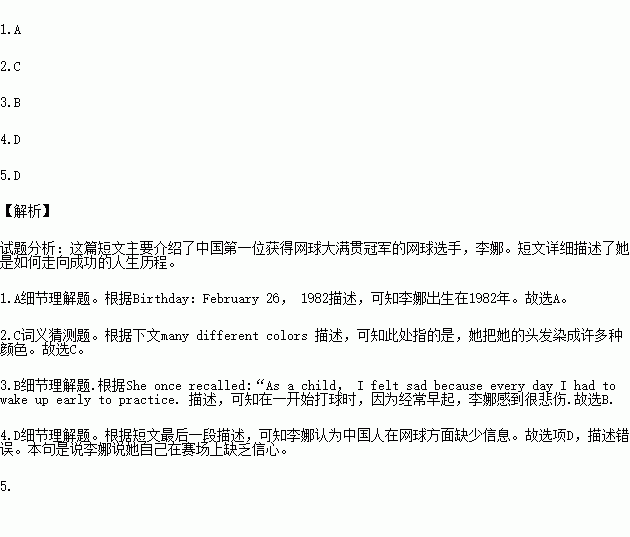题目内容
Birthday:February 26, 1982
Birthplace:Wuhan, Hubei
Height:172cm
Weight:65kg
“My dream has come true. I have always wanted to be a Grand Slam(大满贯) champion.” These are the words of Chinese tennis player Li Na after she became the first Asian woman to win a Grand Slam final in the French Open on June4, 2011.
“People were saying I’m getting old. So this is a great success for such an old woman,” the 29-year-old girl joked.
Miss Li has a tattoo(纹身). She has dyed her hair many different colors. And, at the 2008 Beijing Olympics, she told her fans to “shut up” when they got too noisy in their support.
Li Na was born in Wuhan, she started to play tennis at the age of 6. She once recalled:“As a child, I felt sad because every day I had to wake up early to practice. After school I had to practice more. I didn’t have time to play.”
Luckily, the strong girl didn’t give up, thus making history for Chinese tennis time after time.
Now the new champion is already thinking about winning another Grand Slam title. “when you have one title, surely you will think about another,” she says, not hiding her ambition(雄心)。
“Chinese people are so lacking(缺乏) in confidence on the tennis court. If there is a person like me who can prove we Chinese can do it, the other young players in China will feel the same,” she said.
1. Li Na was born in the year of .
A. 1982 B.1984 C.1986 D.1990
2.The underlined word “dyed” here means “ ” in Chinese.
A. 油 B. 洗烫 C. 染色 D.梳理
3.When she began to play tennis, Li Na was _________.
A. happy B. sad C. excited D. bored
4.Which of the following is WRONG about Li Na?
A. Li Na took part in the 2008 Beijing Olympics.
B. Li Na has already won a Grand Slam champion.
C. Li Na had to wake up early to practice playing tennis.
D. Li Na said she lacked confidence on the tennis court.
5.The passage mainly tell us .
A something about the tennis
B. something about how to play tennis
C the Chinese people and the tennis
D. the Grand Slam champion—Li Na
-OK,I will.( )
| A. | turn up | B. | turn on | C. | turn down | D. | turn off |
--Li Na.( )
| A. | you | B. | your | C. | yours |

